|
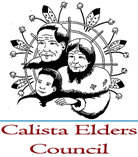 570 3rd Ave # 219 570 3rd Ave # 219
Bethel, AK 99559
(907) 543-1541
 625 C Street
Anchorage, AK 99501 625 C Street
Anchorage, AK 99501
(907)929-9200
anchoragemuseum.org
|
|
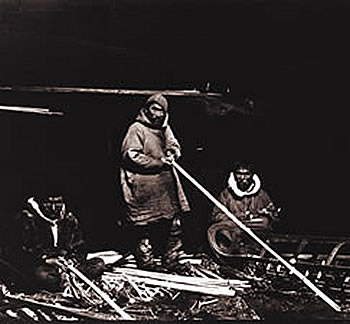 |
Ferdinand Drebert, Moravian Archives, Bethlehem, PA.
|
Frank Andrew's father, Andrew Min'garalria (far left), Cimigaq (Adolf Jimmie's father), and Cingarturta (Paul Paul) working in the qasgi in Kwigillingok, 1930s.
|
 |
Atam uksumi, tua-i December aam maani kinguani, January-m maani nangyartullranek ayagluku qayarkanek-llu up'ngetullrulriit. Tua-i aturkaitnek-gguq upengluteng, up'ngulluki.
Akluteng-llu assivlalriit cimirkiurluki tua-i piqainaurrluki tekipailgan. Qasgi tua-i tamatum nalliini, iluani tua-i calilriaruaqluni. Muragnimek tepengluni qasgi tua-i. Acia tua-i maqarpak canillernek.
Now during winter, sometime after December, at the end of January, they started preparing kayak parts. They'd begin making clothing and getting ready for the spring hunt.
And they'd begin making replacements for garments and implements that were in poor condition, and they got them ready before the hunting season arrived. During that time, the qasgi would be filled with men working. The qasgi would be filled with the scent of driftwood. And the floor around the fire pit would be covered with wood shavings.
--Frank Andrew, Kwigillingok |
| |
Late winter and early spring were times of preparation. While women worked in their homes, sewing new clothing, men worked in the qasgi carving and repairing the tools they would use in the months ahead. |
Kepun Adz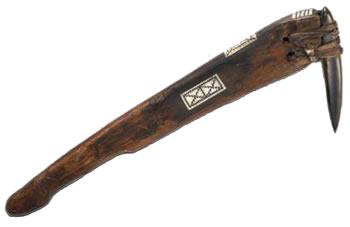 |
Description
Adz- An essential tool used to chop and plane wood.
Dimensions
L- 12 1/2 in
W- 4 in
H- 1 in
Credits
National Museum of the American Indian, Smithsonian Institution 6575
|
Mellgar Crooked Knife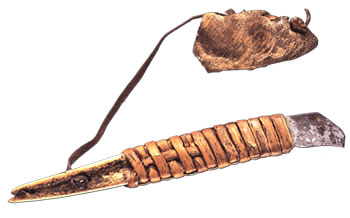 |
Description
Carvers used the blade to smooth and finish rough cut wood, and the bone or antler handle tip to split strips of straight grained wood.
Dimensions
L- 10 1/4 in
H- 2 in
D- 1 in
Credits
A. Martin, 1930s, Kwigillingok
Gift of the Anchorage Museum Association,
Anchorage Museum 2007.009.011
|
Ciklaq Ax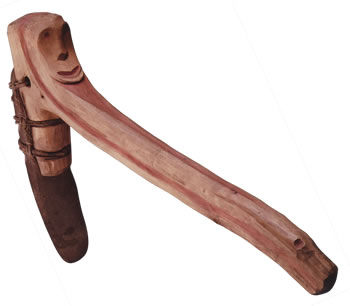 |
Description
From the lower Yukon River for splitting wood.
Dimensions
H- 22 1/2 in
W- 16 1/2 in
H- 3 1/4 in
Credits
Phoebe Apperson Hearst Museum of Anthropology,
University of California, Berkeley 2 4044
|
Aivagun Wedge.jpg) |
Description
Made of antler, used to split wood. The upper example is made from whetstone.
Wassilie Berlin said: "Personally I can't do without wedges. I have assorted kinds at home."
Dimensions
Upper
L- 4 in
W- 1 1/2 in
H- 1 1/4 in
Lower
L- 4 1/2 in
W- 1 1/2 in
D- 1 in
Credits
A. Anariak, Anchorage Municipal Acquisition Fund, Anchorage Museum 1979.076.019
|
Next |
|

